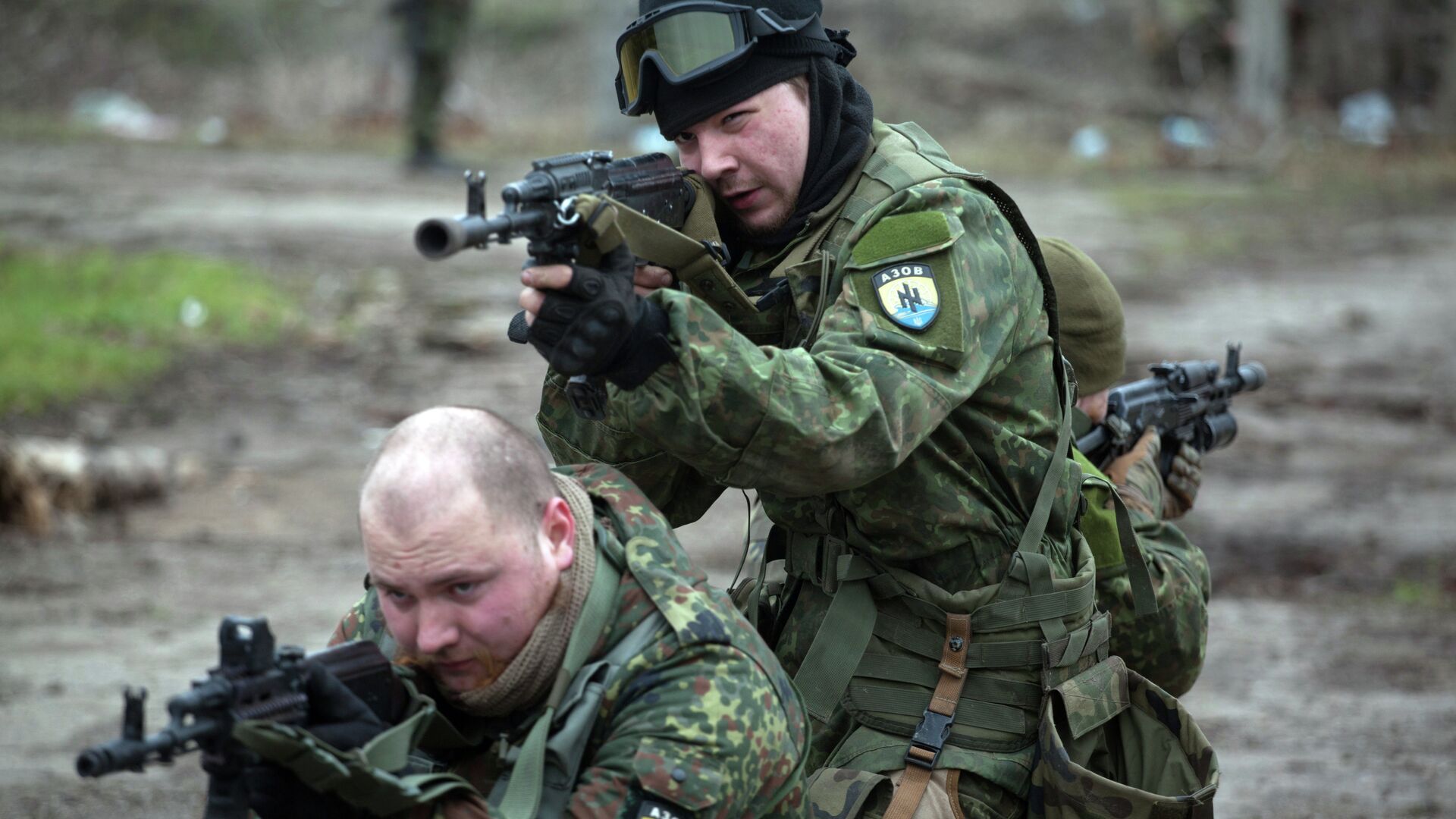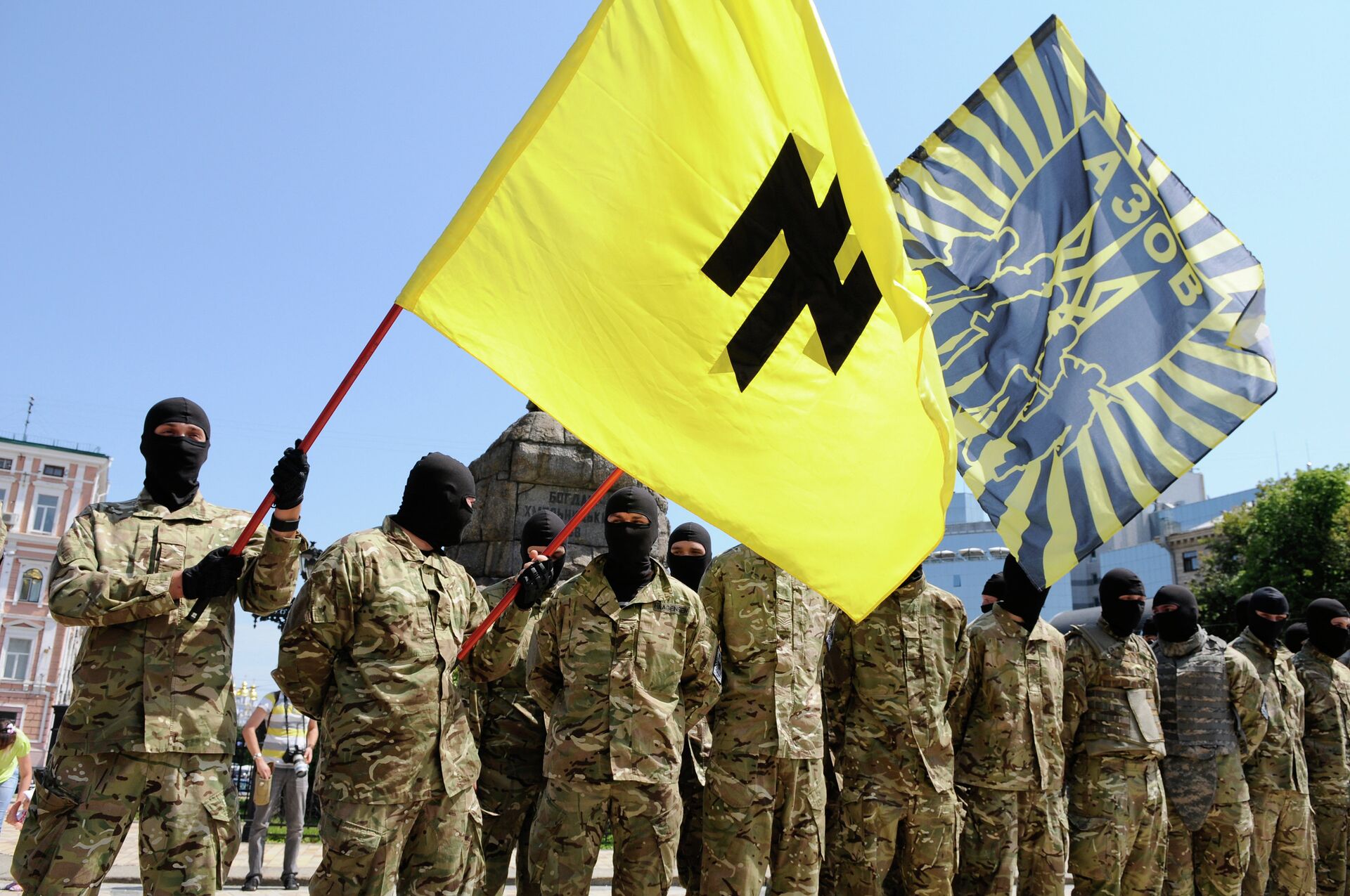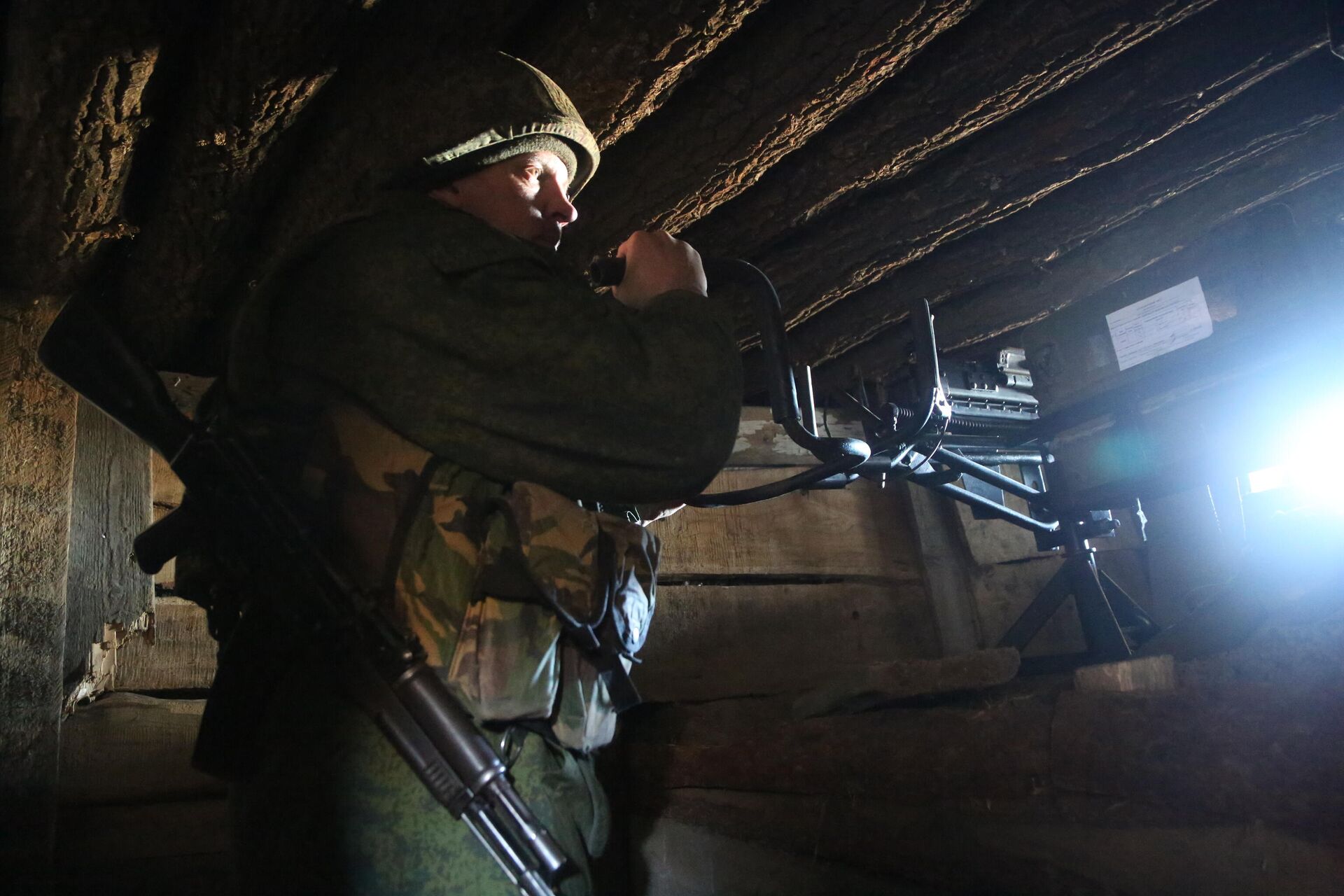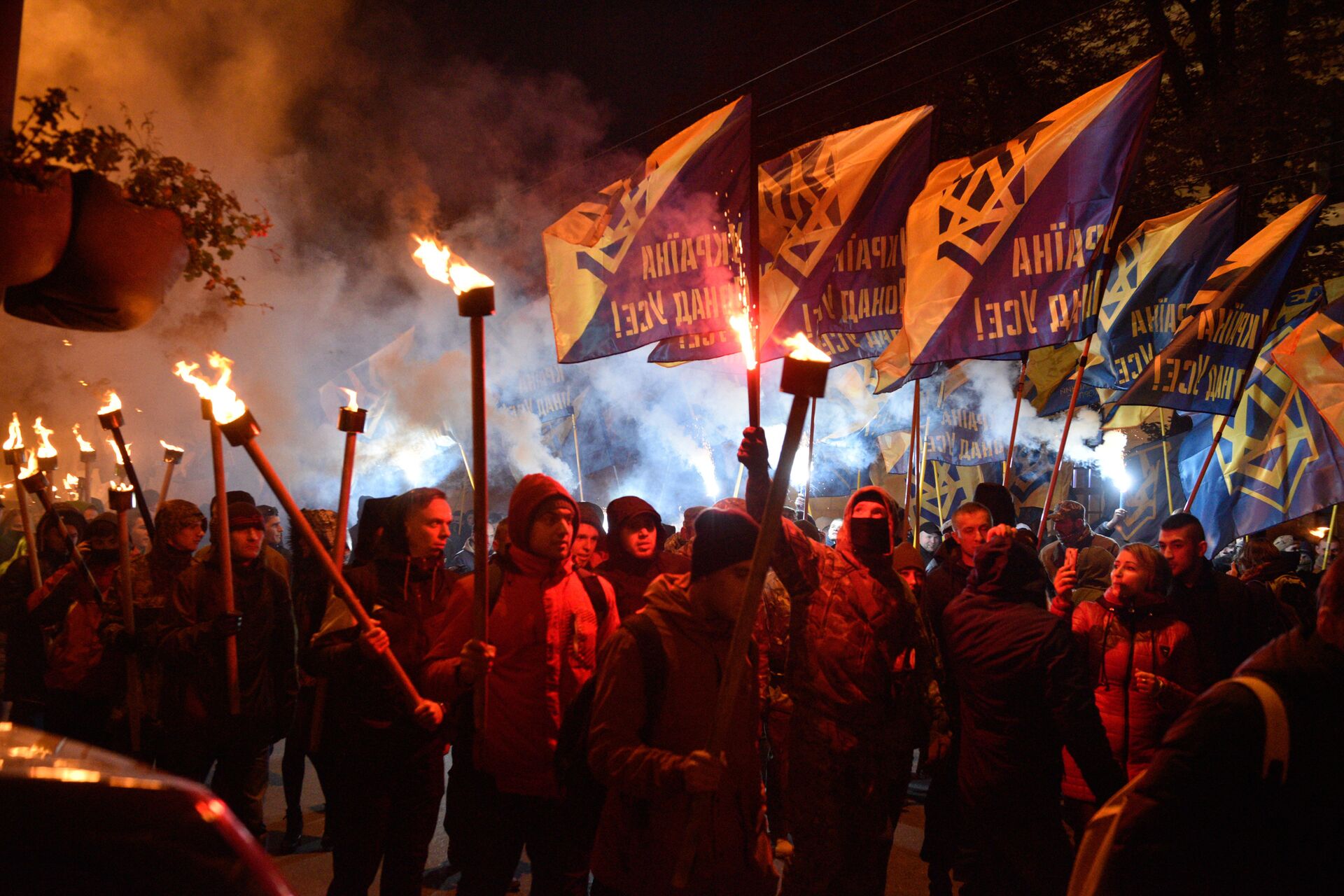https://sputnikglobe.com/20220222/international-observers-us-nato--kiev-laid-the-groundwork-for-donbass-independence-recognition-1093275283.html
International Observers: US, NATO & Kiev Laid the Groundwork for Donbass Independence Recognition
International Observers: US, NATO & Kiev Laid the Groundwork for Donbass Independence Recognition
Sputnik International
In the wake of the Kremlin's recognition of Donetsk and Lugansk, the US, UK, and EU promised more sanctions on Russia. However, these are not the tough... 22.02.2022, Sputnik International
2022-02-22T16:23+0000
2022-02-22T16:23+0000
2022-11-18T09:23+0000
us
europe
russia
opinion
donbass
ukraine
donetsk people's republic
lugansk people’s republic
recognition
independence
https://cdn1.img.sputnikglobe.com/img/102451/50/1024515013_0:293:5616:3452_1920x0_80_0_0_2c154929a8b192adbe8169d19c38a87b.jpg
"The United States has declared the imposition of sanctions relating to the recognition of the two republics. But these sanctions are purely cosmetic", says Gilbert Doctorow, an international relations and Russian affairs analyst. "Europe is going to take some sanctions against individuals whom they say have played a role in these latest decisions by Russia relating to recognition. But that's also purely cosmetic. Serious economic consequences - I don't see any whatsoever".Meanwhile, Berlin has frozen the certification of the Nord Stream 2 natural gas pipeline, running under the Baltic Sea from Russia to Germany. The German Federal Grid Agency temporarily delayed the certification of the pipeline late last year. The agency told Sputnik that it has no forecast about the timing of the renewal of the certification of the Nord Stream 2 operator yet.Despite the US trying to convince Germany to nix the gas pipeline, Berlin never promised to eliminate the project altogether, according to Doctorow. Nord Stream 2 is designed to deliver 55 billion cubic metres (bcm) of natural gas per year to Europe, thus doubling the original Nord Stream capacity to a total of 110 bcm.Kiev Left Donbass With Little, if Any, ChoiceRussia on 21 February recognised the Donetsk and Lugansk People's Republics (DPR and LPR) in response to calls to do so by the Russian State Duma and the DPR, LPR leadership as well as to Kiev's continuing refusal to follow the provisions of the Minsk agreements, struck in 2014 and 2015 and approved by the UN Security Council. The recognition came as the Ukrainian government had amassed considerable forces along the contact line with the two Donbass republics and ramped up shelling last week in a clear violation of the Minsk accords. The leadership of the DPR and LPR announced the evacuation of elderly people, women, and children to Russia. The OSCE reported over 2,000 ceasefire violations on the day of the two republics' recognition.Earlier, the Kiev government made it clear that it would not engage in dialogue with the DPR and LPR, which left the breakaway republics with little, if any, alternatives, according to British-Serbian political commentator Marko Gasic. On 9 February, Ukrainian Foreign Minister Dmytro Kuleba stated that Kiev would not adhere to the Minsk agreements on "Moscow's conditions", and would not engage in direct talks with the breakaway Donetsk and Lugansk People's Republics, which constitutes one of the core provisions of the Minsk deal.Moreover, it has been clear to any objective observer of the situation that Kiev and its Western allies "have always intended to retake the Donbass region by force if necessary", according to Quinn. If Kiev had its way, it would continue to harass the people of Donbass, the commentator notes, adding that in the aftermath of Russia's recognition the people of Eastern Ukraine will be shielded from Kiev's aggression."[Recognition of the DPR and LPR] put a stop to the hot war between the two republics, Donetsk and Lugansk, and the Kievan regime", says Doctorow. "It turned the conflict into what is called a frozen conflict, similar to what exists in Transnistria, with respect to Moldova, what exists in Abkhazia and South Ossetia, with respect to Georgia, nobody is fighting. Nobody is dying".Donbass Independence is Result of US-NATO ActionsThe unfolding Ukrainian crisis is the product of the US and its NATO allies' policies, according to the observers.Under these circumstances, Russia's recognition of Donbass' sovereignty "has to be measured against the danger of doing nothing, a passivity which would clearly allow a real humanitarian catastrophe to unfold in the Donbass", according to the British-Serbian commentator. In addition to this, Moscow faced clear geopolitical danger posed by "the military intentions of Kiev's NATO puppet regime in its joint operations with NATO on Russia's doorstep", he notes.However, the West's understanding of the situation is "limited", according to Gilbert Doctorow. He notes that the most surprising case is Germany and Chancellor Olaf Scholz's remark that Russia's warning of the ongoing genocide in Eastern Ukraine by the Kiev military and neo-Nazi battalions is "ridiculous".While the US, UK, and EU are not listening to Russia's arguments, they can't go much further in demonising Russia, Doctorow believes.As for recognition of Crimea and Donbass, the US and NATO set a solid legal precedent when they recognised Kosovo's sovereignty and carved the region out of Serbia, according to Doctorow. The recognition of independence on the basis of the Donbass republics' popular mandate and the right to self-determination is a very strong legal argument, he notes. "[It is] very embarrassing for the United States to try to say no", the analyst concludes.
donbass
ukraine
Sputnik International
feedback@sputniknews.com
+74956456601
MIA „Rossiya Segodnya“
2022
News
en_EN
Sputnik International
feedback@sputniknews.com
+74956456601
MIA „Rossiya Segodnya“
Sputnik International
feedback@sputniknews.com
+74956456601
MIA „Rossiya Segodnya“
us, europe, opinion, donbass, ukraine, donetsk people's republic, lugansk people’s republic, recognition, independence, sanctions, nord stream 2, neo-nazis
us, europe, opinion, donbass, ukraine, donetsk people's republic, lugansk people’s republic, recognition, independence, sanctions, nord stream 2, neo-nazis
International Observers: US, NATO & Kiev Laid the Groundwork for Donbass Independence Recognition
16:23 GMT 22.02.2022 (Updated: 09:23 GMT 18.11.2022) In the wake of the Kremlin's recognition of Donetsk and Lugansk, the US, UK, and EU promised more sanctions on Russia. However, these are not the tough measures they have threatened Moscow with for the past few months. Rather, they are comparable to the sanctions adopted by the West after Crimea's reunification with Russia, according to reports.
"The United States has declared the imposition of sanctions relating to the recognition of the two republics. But these sanctions are purely cosmetic", says Gilbert Doctorow, an international relations and Russian affairs analyst. "Europe is going to take some sanctions against individuals whom they say have played a role in these latest decisions by Russia relating to recognition. But that's also purely cosmetic. Serious economic consequences - I don't see any whatsoever".
Meanwhile,
Berlin has frozen the certification of the Nord Stream 2 natural gas pipeline, running under the Baltic Sea from Russia to Germany. The German Federal Grid Agency temporarily delayed the certification of the pipeline late last year. The agency told Sputnik that it has no forecast about the timing of the renewal of the certification of the Nord Stream 2 operator yet.
Despite the US trying to convince Germany to nix the gas pipeline,
Berlin never promised to eliminate the project altogether, according to Doctorow. Nord Stream 2 is designed to deliver 55 billion cubic metres (bcm) of natural gas per year to Europe, thus doubling the original Nord Stream capacity to a total of 110 bcm.
"What happened [on 21 February] is quite minor in terms of an infraction of the Western-dominated world", says Doctorow. "So, I don't expect anything. However, what happened yesterday is only the first of many steps that will come as Russia seeks to get the capitulation of the United States and NATO to its demands of 15 December regarding the reorganisation of European security".
Kiev Left Donbass With Little, if Any, Choice
Russia on 21 February recognised the Donetsk and Lugansk People's Republics (DPR and LPR) in response to calls to do so by the Russian State Duma and the DPR, LPR leadership as well as to Kiev's continuing refusal to follow the provisions of the Minsk agreements, struck in 2014 and 2015 and approved by the UN Security Council. The recognition came as the Ukrainian government had amassed considerable forces along the contact line with the two Donbass republics and ramped up shelling last week in a clear violation of the Minsk accords. The leadership of the DPR and LPR announced the evacuation of elderly people, women, and children to Russia. The OSCE reported over 2,000 ceasefire violations on the day of the two republics' recognition.
"Over the past eight years, Kiev has repeatedly infringed the Minsk Agreements in many ways, including the murder of the former prime minister of the Donetsk People's Republic, Alexander Zakharchenko", says Joe Quinn, a Paris-based political commentator and author. "Kiev felt confident that it could flout the agreements with impunity because it believed it had the political, economic and military backing of both the US and major European nations".
Earlier, the Kiev government made it clear that it would not engage in dialogue with the DPR and LPR, which left the breakaway republics with little, if any, alternatives, according to British-Serbian political commentator Marko Gasic. On 9 February, Ukrainian Foreign Minister Dmytro Kuleba stated that Kiev would not adhere to the Minsk agreements on "Moscow's conditions", and would not engage in direct talks with the breakaway Donetsk and Lugansk People's Republics, which constitutes one of the core provisions of the Minsk deal.
"Kiev does therefore look like it has forfeited any moral right to govern those people since it probably prefers to exterminate or expel them", Gasic remarks.
Moreover, it has been clear to any objective observer of the situation that Kiev and its Western allies "have always intended to retake the Donbass region by force if necessary", according to Quinn. If Kiev had its way, it would continue to harass the people of Donbass, the commentator notes, adding that in the aftermath of Russia's recognition the people of Eastern Ukraine will be shielded from Kiev's aggression.
"[Recognition of the DPR and LPR] put a stop to the hot war between the two republics, Donetsk and Lugansk, and the Kievan regime", says Doctorow. "It turned the conflict into what is called a frozen conflict, similar to what exists in Transnistria, with respect to Moldova, what exists in Abkhazia and South Ossetia, with respect to Georgia, nobody is fighting. Nobody is dying".
Donbass Independence is Result of US-NATO Actions
The unfolding Ukrainian crisis is the product of the US and its NATO allies' policies, according to the observers.
"Had Washington properly encouraged Kiev to reach an accommodation with the people of Donbass, then Moscow's declaration regarding Donbass independence and protection would not have been necessary, nor made", says Marko Gasic.
Under these circumstances, Russia's recognition of Donbass' sovereignty "has to be measured against the danger of doing nothing, a passivity which would clearly allow a real humanitarian catastrophe to unfold in the Donbass", according to the British-Serbian commentator. In addition to this, Moscow faced clear geopolitical danger posed by "the military intentions of Kiev's NATO puppet regime in its joint operations with NATO on Russia's doorstep", he notes.
However, the West's understanding of the situation is "limited", according to Gilbert Doctorow. He notes that the most surprising case is Germany and Chancellor Olaf Scholz's remark that Russia's warning of the ongoing genocide in Eastern Ukraine by the Kiev military and neo-Nazi battalions is "ridiculous".
While the US, UK, and EU are not listening to Russia's arguments, they can't go much further in demonising Russia, Doctorow believes.
"We've already hit bottom. But take Russia seriously? Yes", he says.
As for recognition of Crimea and Donbass, the US and NATO set a solid legal precedent when they recognised Kosovo's sovereignty and carved the region out of Serbia, according to Doctorow. The recognition of independence on the basis of the Donbass republics' popular mandate and the right to self-determination is a very strong legal argument, he notes. "[It is] very embarrassing for the United States to try to say no", the analyst concludes.





